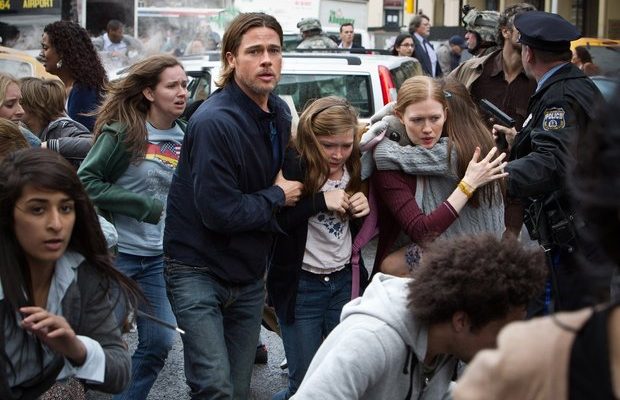
Paramount must be annoyed. Just a few weeks after the Entertainment Weekly piece on the much-maligned Brad Pitt-starring “World War Z” zombie movie played down the signal to noise ratio on the “troubled production,” Vanity Fair has jumped into the fray, dredging up more of the dirt on this runaway-freight-train of a blockbuster. To be fair, the “World War Z” story seems complicated, a series of many small and medium size issues snowballing into a near-disaster of a production, but in comparison, EW’s feature is kind of a damage-control-y “nothing to see here, please disperse” response.
That doesn’t mean one is more correct than the other and in all fairness, the VF piece isn’t filled with major pieces of dirt, but it does tell a bigger picture about what went wrong. But in the interest of brevity, we’ve tried condensing the sprawling feature into its key points. And the big takeaways from all of this are that a lack of leadership, inexperience and a confluence of mistakes caused an excessively costly tentpole that, according to the magazine, will need to gross $400 million to break even. Mild spoilers below, but keep in mind this film is intended to spawn a franchise for Pitt and Paramount.
“No one came to me and said, ‘You are fucking up here,’ ” director Marc Forster said. “So if there are any budgetary issues, they are not my issues.”
1. J. Michael Straczynski’s initial script was tossed out for something more action driven.
While the geo-political elements of “World War Z” were ostensibly what brought Pitt’s Plan B production company to outbid Leonardo DiCaprio’s Appian Way for the rights ($1 million is the rumor) to Max Brooks‘ book in the first place — the idea of how would world leaders react to a pandemic and what those consequences would be? — in the end they went for something action-y and tossed out Straczynski’s script. Evidently, Marc Forster was looking to redeem himself in the action-franchise realm after the critically despised “Quantum Of Solace” so he gravitated towards bigger, louder and stronger. And so did everyone else, Pitt included.
“Marc wanted to make a big , huge action movie that wasn’t terribly smart and had big, huge set pieces in it,” Straczynski, the creator of “Babylon 5” told Vanity Fair. “If all you wanted to do was as empty-headed Rambo-versus-the-zombies action film, why option this really elegant, smart book?”
They hired Matthew Michael Carnahan (“State Of Play,” “Lion For Lambs“) and his more action-y script finally met Pitt’s approval and was greenlit. Before that, Straczynski tried to write another draft that he tried to make more palatable to Forster’s aims. Evidently it still wasn’t enough in the direction they ultimately chose to go according to the writer. “They slammed the door in my face so hard it came off the hinges,” he said.
2. However, everyone chased their tail and ended up with what they started with: a more thoughtful drama with an emotional finish.
Much has been made about the Russian set ending in “World War Z” (the film has three main settings, Philadelphia, Israel and Russia). The gist of it: In Russia, humans are kept as slaves, presumably to stave off the hordes of zombies — and the original climax of ‘WWZ’ has Pitt freeing these slaves and enlisting them to fight off and kill the zombie army off with “lobotomizing” sheaths that take off zombies’ heads. It was evidently a huge set piece (taking up almost 15 minutes of the film) and super expensive, but there were three essential problems:
a) These sequences were gruesome and veered close to an R-Rating whereas ‘WWZ’ was contractually obligated to bring in a PG-13 (“The question was: how graphic can it be and get that rating?” one source questioned).
b) They showed Pitt in an unsympathetic light as a savage zombie killing leader.
c) It didn’t reunite Pitt with his family and had no payoff. The film starts out with Pitt having to abandon his family to help save the world and this version — hoping he could find them in the next movie — didn’t reunite him with his wife and kids, but that left for a cold and bleak ending that concluded with an emotionally hollow and bloody victory with no emotional resolution.

